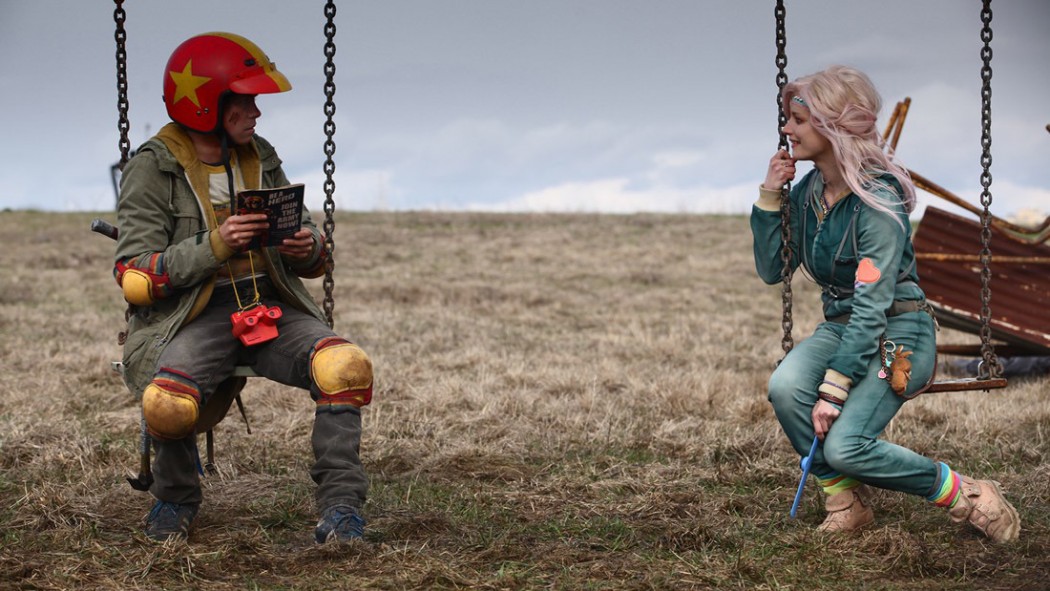Sundance’s breakout genre hit uses 80s nostalgia to show why nostalgia kind of sucks
I was born late enough in the 1980s that the decade’s pop cultural touchstones hold no real nostalgia for me. Sure, I enjoy E.T. the Extra-Terrestrial and Gremlins as much as the next self-respecting millennial, but overall detachment from the decade allows me to recognize that “jeans with zippers on the legs” was a weird fashion trend and The Princess Bride is merely okay. I also understand that compared with my slightly older contemporaries, I’m probably in the minority. The Amblin generation, now in their mid- to late-30s, have become the creators, bringing their affection for Goonies and synth-pop into their art.
Enter the three minds behind Turbo Kid, which plays this Sat at 9:00p in the Marquee film Festival. Anouk Whissell, François Simard, and Yoann-Karl Whissell claim in their Sundance 2015 preview that they A) really love genre films B) especially the ones from their childhood. Just watch the short that started this whole thing:
The three co-directors aren’t hiding anything about their love of genre in this feature-length debut, where Karate Kid mumbo jumbo, 8-bit video game interfaces and power-up sound effects scream out 1984. Even the name feels like a nod to Ralph Macchio, albeit Macchio in a crimson Mega Man-styled powersuit. Munro Chambers (Degrassi) stars as “The Kid,” a parent-less teenager wandering the dying trees and graying skies of a apocalyptic wasteland. Survivors of the vague global disaster that’s rendered natural water undrinkable are now forced to pedaling through garbage heaps and junkyards on BMX bicycles, cobbling together makeshift suits of armor from football pads and recycled kitchen appliances.
The Kid’s solitude of scavenging and poring through issues of his comic book idol, The Turbo Rider, is interrupted when he meets Apple (Laurence Leboeuf), a sprightly young woman whose exuberance for life baffles the Kid’s despondent survivalism and inarguably steals each and every scene Leboeuf’s in. Together, the pair will learn from one another. Apple uses The Kid as a window through which to marvel at the desert’s under-appreciated riches, while the Kid learns to not be such an aloof dingus. They’ll have to work together, with help from Aaron Jeffery’s arm-wrestling Kiwi cowboy, if they’re to escape the pursuit of the one-eyed Zeus (Michael Ironside), who’s hellbent on grinding up everyone and purifying their liquified remains into a cleaner source of hydration.
Soylent connection aside, if this seems a little basic, that’s because it is. Whissell, Simard, and Whissell might want us to care about The Kid, but any sympathy for him is only given lip service, cross-cutting between present day and bits of backstory about his parents’ unfortunate fates. Turbo Kid‘s dramatic impulses come directly from its setting and just how blackhearted its world has become. We want The Kid and Apple to survive because everyone’s a violent brat, like kidified versions of one big Mad Max villain composite.
Forget the narrative, though. Whissell, Simard, and Whissell use their nostalgic late night aesthetic to create a profound arrested development. Characters may have facial hair and deep voices but these are adults playing with laser guns and idolizing pulp stories (The Kid receives the moniker of “Turbo Kid” after stumbling across a downed spaceship and donning his fallen hero’s well-fitting gear). There may be only one Kid, but nobody here has grown up. Turbo Kid‘s flashbacks show just how little anyone’s changed, yelling threats from the bike seats of their war machines like neighborhood teens re-enacting favorite movies. In the silly, bloody climax, someone utters in expected overly-dramatic fashion, “Playtime’s over!” If only.
- Turbo Kid plays Sat Nov 14 at 9:00p. It’s part of the Marquee Film Festival at Union South, which we’re covering with our friends at Madison Film Forum all week. Admission is FREE.

